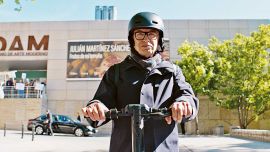Police officer Franco Arias is celebrating his 38th birthday today. But though he will be surrounded by his loving family, it will be a bleak affair as he can’t afford to splash out.
“It will just be a small asado for a few of us,” he sighs.
Franco is one of a rare group of police officers who have won two gold medals for valour in the course of duty. But times are hard: he's already sold the first one to make ends meet, and is now contemplating auctioning off the second.
Arias is one of 125 police officers in Salta who have been forced into obligatory retirement from the force because they have been off long-term sick. Like many of the others, he received his dismissal letter during quarantine, despite a national government ban on dismissals that’s been in place since mid-March.
Franco was awarded a gold medal after confronting a Colombian hitman on the Bolivian border in November 2014. He had been assigned to protect a councillor and his family in Salvador Mazza after they were threatened by a drug gang.
The border town, also known as Pocitos, is a hotspot for cocaine-smuggling; just last Saturday a cab driver was assassinated, in what is thought to have been a settling of scores over a drug deal.
In what sounds like a scene ripped straight out of a James Bond movie, after a shoot-out on the international bridge crossing the river, both Franco and the hitman ran out of bullets.
“We tussled and fell 15 metres off the bridge together. I banged my head and dislocated my shoulder but managed to handcuff him before passing out, so my colleagues were able to reach us and arrest him. I was back working again the next day, because I love the police," he told the Times.
Arias was awarded another gold medal in 2013 after saving a would-be suicide from jumping off a bridge in Tartagal. Again, it came at a cost.
“I managed to handcuff him before he threw himself off the bridge. I had his whole body hanging into the void. I broke my collar-bone and ripped tendons in my right arm," he recalls.
Franco, a member of Salta Police's elite motorcycle squadron who served for 14 years, was honoured by former provincial governor Juan Manual Urtubey, vice-presidential running mate to Consenso Federal hopeful, former economy minister Roberto Lavagna, in last year's election.
Despite his injuries, Franco carried on working, ignoring signs of stress and injury, until one day he realised he couldn't lift his arms up to put his motorcycle helmet on.
He was diagnosed with post-traumatic stress disorder, and invalided out of the police with 70 percent discapacity.
"I was trembling, breaking into cold sweats. I fainted, I was scared to go out. But the medical certificate said that my pathology had nothing to do with what had happened during my service," he said.
Making ends meet
Franco spends around 5,000 pesos a week on medication that’s not covered by his health insurance. He’s set up a sandwich delivery business with his wife Fabiana, which they run from their home in Embarcación, Salta.
He received his last payment of 32,000 pesos from the police in March, and has since resorted to selling home furnishings and even his beloved motorcycle to make ends meet.
He sold one of his gold medals for 20,000 pesos, and is now contemplating finding a buyer for the other.
"One day I didn’t even have the money to buy the medication, so I decided to sell the medal.
“It takes seven or eight months for [the] ANSES [social security agency] to process the pensions, and I'm expecting to get 10,000 a month.
“I’ve kept quiet in the hope that the police would sort this out, but now I’ve got nothing left to lose."
Fabiana, 33, says her husband puts a brave face on for the children, Franco (15) Abril (14) and Pablo (12).
“If he goes a day without taking his tablets he feels bad. He seems fine, but then suddenly he will have a panic attack. Sometimes he cries without stopping.”
Franco's case, along with that of the other dismissed officers, has now been taken up by the National Campaign against Institutional Violence in the Security Forces (Mesa Nacional Contra la Violencia Institutional en las Fuerzas de Seguridad: MNCVI).
The obligatory retirement of police officers in Salta, on long-term sick leave, decree 162/17 was passed three years ago, but only recently implemented.
The MNCVI has submitted a court order claiming the provincial government is infringing the human rights of the police officers, and is in conflict with the national government's prohibition on the dismissal of employees during quarantine, emergency decree 329/20
Lawyer Sergio Bustos, who is representing the MNCVI, said: "It seems to be a clear case of trying to cut costs, but at the worst possible time for these police officers.
“Many of these officers received their dismissal letters after March 20, when quarantine had begun, which is in contravention of government policy. They also have to rely on the police force to begin their pension application, and many of them complain that it is not happening quickly enough."
Bustos added that Uruguay is the only country in Latin America that has a police trade union: meaning officers have to rely on the goodwill of their employers.
As it currently stands, they’re being let down.
‘It’s not just a man who’s lost his health, it’s a family that has been left ruined’
Carlos Visgarra, 40, was awarded a gold medal for bravery after confronting an angry mob trying to impede the arrest of a suspect in October 2012. But he was let go by the police force after suffering a fractured skull in the incident: and has now been forced to retire.
“It was a new police post in a difficult part of the city: there were six police officers and only three helmets, and just his luck, he was one who was left without a helmet,” his wife Claudia told the Times.
“When he was first invalided out of the force, they didn’t come and collect his gun. I slept with one eye open at night, worried he would kill himself.
“He can’t talk properly, he can’t go out in public, as he can’t bear loud or sudden noises. We can’t leave him on his own.”
Claudia, also 40, has herself been suffering from ill health: something she thinks is linked to the stress of coping with Carlos' illness.
"We are waiting for Carlos’ pension of 13,000 pesos per month. In the meantime we’re getting by on a few thousand pésos a month. I don't know from one day to the next if I've got enough money to buy food.
“Carlos and I look after each other at the moment, but I worry for the future for our kids."
‘My son was a man of healthy mind and body, and now he’s like a child’
Gloria Rodríguez is the sole carer for her son Miguel Ángel, a police officer forced to retire after suffering multiple trauma while on duty.
Rodríguez, now 49, was attacked by an angry mob while guarding a prisoner in General Guemes, Salta, in October 2012.
He has been diagnosed with post-traumatic stress disorder and neurological damage, and forced to retire after 16 years service.
Gloria told the Times: “He was knocked unconscious in the attack. It’s a miracle he wasn’t killed.
“I gave my only son to the police, a boy who was of healthy mind and body. He’s now like a child, he uses nappies. He walks with difficulty. He talks but he doesn’t really know what’s going on around him.”
“My life has changed completely. I live on the minimum pension. I have to ration the food to get by.
“I pray to God that he doesn’t take me first, that he takes both of us together”.


























Comments